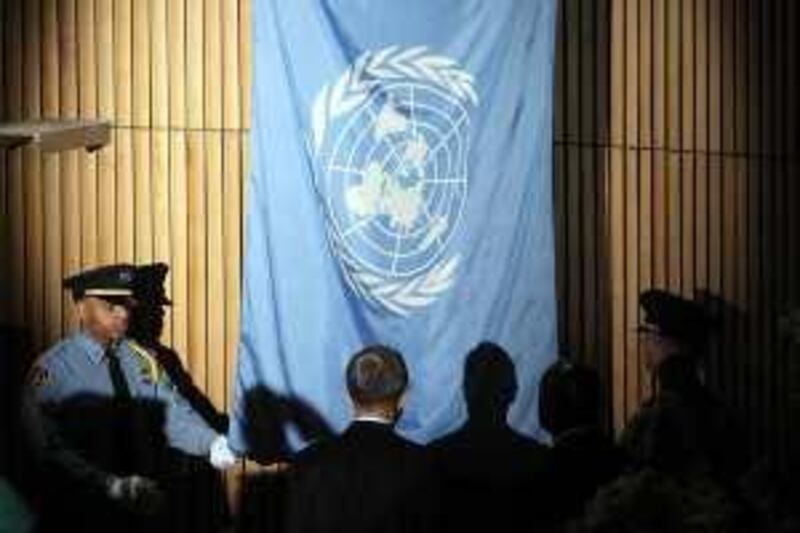NEW YORK // The UN held a memorial service for staffers and peacekeepers killed during the earthquake in Haiti while allegations of a weak humanitarian response to the Caribbean calamity continue.
The secretary general, Ban Ki-moon, wiped tears from his eyes during a candlelit memorial service at the world body's Manhattan headquarters on Tuesday while telling family members of the 101 UN casualties they had "carried the light of hope". Haiti's devastating magnitude 7 quake made January 12, 2010, the worst day in UN history, easily topping the combined number of victims of extremists launching bomb attacks on the organisation's offices in Baghdad in 2003 and Algiers in 2007.
But as classical music echoed through the Trusteeship Council Chamber and 101 candles burnt to symbolise the civilians, military and police killed, question marks lingered over the effectiveness of the UN response to Haiti's tragedy. UN officials have described the quake as the "most complex humanitarian response we have ever had to deal with". The capital, Port-au-Prince, was devastated, and both the national government and the UN stabilisation mission, known by its French acronym Minustah, were ravaged. More than 220,000 people were killed and half the nation's economy wiped out.
But criticism of the humanitarian response goes beyond weaknesses in initial aid deliveries. Critics say the UN is failing to co-ordinate those efforts and that many survivors still lack security in makeshift camps two months after the disaster. The Red Cross warned this week that only half of the 1.3 million people left homeless by the quake currently have shelter. About 650,000 survivors still need tarpaulins, tents, ropes and tools to erect shelters before Haiti's impending monsoon-like rainy season peaks in May. The Atlantic hurricane season then begins and lasts through November. Experts warn that some of the capital's 900 makeshift camps could be washed away in landslides or turn into unsanitary mud baths.
Edmond Mullet, the UN mission chief in Haiti, listed "shelter, shelter and shelter" as his top priorities while briefing journalists on Tuesday. He warned that "we will not be able to provide hard-wall housing or protection for everybody in Port-au-Prince before the month of June" and said homeless Haitians will have to seek refuge in communal shelters during heavy winds and rains. His special adviser, Michèle Montas, Mr Ban's chief spokesman and a Haitian native herself, said the government has located five sites for aid agencies to build semi-permanent camps with sanitation and storm protection, but progress was stalled as officials haggled with landowners over leasing contracts.
Anna Neistat, an emergency expert for the New York-based pressure group Human Rights Watch, urged the Haitian government and the UN to stop dragging their feet over erecting safe and secure camps and quickly resettle the homeless. "The government needs to take urgent measures to make this land available for the humanitarian community to act. So far we have not seen sufficient movement on that," she said. "We are, at best, three weeks before the rainy season starts in Haiti and unless people are moved from the sites where they currently are we will be faced with yet another disaster."
After a 10-day research mission to Haiti last month, Ms Neistat wrote to the UN Security Council warning that most of the makeshift camps in Port-au-Prince and Jacmel, a southern port, have "zero security" and described three gang rapes in one crowded centre in Parc Jean Marie Vincent. The letter warned that makeshift camps lack bathrooms, meaning "women wanting privacy to bathe seek out isolated, dark areas, leaving them vulnerable to attack". Many camps have no electric lighting and become dark and unsafe after sunset, with neither Haitian nor UN police conducting patrols frequently enough to provide security.
"Seeing those camps, with all the tents, it's really difficult to do patrolling and to reach out," Anne-Marie Orler, a police adviser to the UN peacekeeping department, said after her own trip to Haiti. "But what is on the agenda is a joint assessment together with all actors and NGOs and relevant partners to come up with a plan of how to deal with this." A report from Refugees International also claimed that homeless Haitians are unsafe. Patrick Duplat, an analyst, blamed poor UN co-ordination for leaving a situation in which "agencies are still moving too slowly to provide basic supplies like tents and tarps".
While the UN defends itself publicly from criticism, failures in Haiti are discernible from within the institution. The UN's top humanitarian, Sir John Holmes, chided his staff for weak co-ordination. In an internal organisational e-mail, leaked to the media, Mr Holmes criticised colleagues for "major unmet humanitarian needs", particularly on shelter and sanitation, and called on UN aid teams to "develop coherent response plans" and "pursue a much more aggressive approach" to delivering assistance.
Amid claims that some Haitians are still without humanitarian support, aid workers in the capital handed out bags of rice this week as part of a World Food Programme "food surge" designed to feed 1.9 million people for a month. At the packed memorial chamber at UN headquarters, Mr Ban delivered what some have described as his most emotional speech as secretary general. He promised to "carry on" the work of the 101 UN casualties and echoed the post-disaster mantra to "build back better".
After a minute's silence, webcast live to UN offices around the globe, Haiti's ambassador to the world body, Leo Mérorès, said the UN deaths served to remind aid chiefs of the importance of getting it right in Haiti. "Their memory will be - an additional reason to encourage us to continue and to complete the work that they started. Their sacrifice will not have been in vain." @Email:jreinl@thenational.ae







